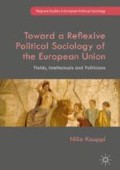Abstract
This chapter proposes some elements for a structural constructivist conception of integration. The author understands integration as a key element in differentiation and stratification processes, more specifically of professional specialization and the formation of a variety of political, cultural and social hierarchies and spaces. He argues that this perspective provides us with a more informative picture of IR and regional integration that challenges intergovernmentalist, neofunctionalist and social constructivist accounts. These are based on sociologically weakly developed conceptions of agency, the state and power. In the mainstream literature, agency is often conceived of as institutional agency, the state and power being objectified in materialized forms. States exist and act ‘out there’ as relatively homogeneous and unitary, quasiphysical entities.
Access this chapter
Tax calculation will be finalised at checkout
Purchases are for personal use only
Bibliography
Abélès, M. (1990). La vie quotidienne au Parlement européen. Paris: Hachette.
Adler-Nissen, R. (2008). The Diplomacy of Opting Out. Journal of Common Market Studies, 46(3), 663–684.
Adler-Nissen, R. (2013). European Diplomats: State Nobility and the Invention of a New Social Group. In Kauppi and Madsen (Eds.), 65–80.
Baldwin, R. E. (1997). The Causes of Regionalism. The World Economy, 20(7), 865–888.
Beauvallet, W., & Michon, S. (2010). Professionalization and Socialization of the Members of the European Parliament. French Politics, 8(2), 145–165.
Beauvallet, W., Michon, S., Lepaux, V., & Monicolle, C. (2016). The Changing Composition of the European Parliament: MEPs from 1979 to 2014. French Politics, 14(1), 101–125.
Berger, P., & Luckmann, T. (1966). The Social Construction of Reality. Harmondsworth: Penguin.
Bomberg, E., Peterson, J., & Stubb, A. (Eds.). (2008). The European Union: How Does it Work? Oxford: Oxford University Press.
Bourdieu, P. (1998). La domination masculine. Paris: Le Seuil.
Christiansen, T., Jørgensen, K. E., & Wiener, A. (Eds.). (2001). The Social Construction of Europe. Thousand Oaks: Sage.
Costa, O. (2001). Le parlement européen, assemblée délibérante. Bruxelles: Editions de l’Université de Bruxelles.
de Certeau, M. (2002). The Practice of Everyday Life. Berkeley: University of California Press.
Deutsch, K. W. (1962). Nationalism and Social Communication. An Inquiry into the Foundations of Nationality (2nd ed.). Cambridge: The MIT Press.
Favell, A., & Guiraudon, V. (2011). Introduction. In A. Favell & V. Guiraudon (Eds.), The Sociology of the EU (pp. 1–24). Basingstoke: Palgrave Macmillan.
Georgakakis, D., & de Lassalle, M. (2007). Genèse et structure d’un capital institutionnel européen. Les très hauts fonctionnaires de la Commission européenne. Actes de la recherche en sciences sociales, 166–167, 39–53.
Gornitzka, Å. (2010). Bologna in Context: A Horizontal Perspective. On the Dynamics of Governance Sites for a Europe of Knowledge. European Journal of Education, 45(4), 535–548.
Haas, E. B. (1958). The Uniting of Europe: Political, Social, and Economic Forces, 1950–1957. Notre Dame: University of Notre Dame Press.
Havel, V. (1985). The Power of the Powerless. London: Hutchinson.
Hix, S., & Høyland, B. (2011). The Political System of the European Union. Basingstoke: Palgrave Macmillan.
Kauppi, N. (2005). Democracy, Social Resources and Political Power in the European Union. Manchester: Manchester University Press.
Kauppi, N., & Madsen, M. R. (Eds.). (2013). Transnational Power Elites. The New Professionals of Governance, Law and Security. Abingdon: Routledge.
Kelemen, R. D., & Tarrant, A. D. (2011). The Political Foundations of Eurocracy. West European Politics, 34(5), 922–937.
Knudsen, A.-C. L. (2009). Farmers on Welfare. The Making of Europe’s Common Agricultural Policy. Ithaca: Cornell University Press.
Landorff, L. (2016). Intergroups in the European Parliament: Social, Informational and Political Capital of MEPs. Unpublished PhD Dissertation, University of Bremen.
Lipset, S. M. (1962). Political Man. The Social Bases of Politics. Garden City: Anchor Books.
Madsen, M. R. (2011). La genèse de l’Europe des droits de l’homme: Enjeux juridiques et stratégies d’Etat (1945–1970). Strasbourg: Presses universitaires de Strasbourg.
Mangenot, M. (1998). Une école européenne d’administration ? L’improbable conversion de l’ENA à l’Europe. Politix, 43, 7–32.
March, J., & Olsen, J. P. (2004). The Logic of Appropriateness. ARENA Working Paper 9/9.
Mauss, M. (1997). Ecrits politiques. Paris: Fayard.
Moravcsik, A. (1998). The Choice for Europe: Social Purpose and State Power from Messina to Maastricht. Ithaca: Cornell University Press.
Navarro, J. (2009). Les députés européens et leurs rôles: analyse sociologique de la représentation parlementaire dans l’Union Européenne. Bruxelles: Editions de l’Université de Bruxelles.
Nye, J. S. (1968). Comparative Regional Integration: Concept and Measurement. International Organisation, 22(4), 855–880.
Page, E. C. (1997). People Who Run Europe. Oxford: Oxford University Press.
Pouliot, V. (2010). International Security in Practice. The Politics of NATO-Russia Diplomacy. Cambridge: Cambridge University Press.
Putnam, R. (2000). Bowling Alone. The Collapse and Revival of American Community. New York: Simon & Schuster.
Rasmussen, M. (2008). The Origins of a Legal Revolution – The Early History of the European Court of Justice. Journal of European Integration History, 14(2), 77–98.
Reif, K., & Schmitt, H. (1980). Nine Second-Order National Elections: A Conceptual Framework for the Analysis of European Election Results. European Journal of Political Research, 8, 3–44.
Rosamond, B. (1999). Theories of European Integration. London: Palgrave.
Ross, G. (1995). Jacques Delors and European Integration. Oxford: Oxford University Press.
Schimmelfennig, F. (2002). Goffman Meets IR: Dramaturgical Action in International Community. International Review of Sociology, 12(3), 417–438.
Shemer-Kunz, Y. (2013). From Paris to Brussels and back: The French Greens and the European Elections of 2009. In B. Crum & J. E. Fossum (Eds.), Practices of Inter-Parliamentary Coordination in International Politics. The European Union and Beyond (pp. 161–174). Essex: ECPR Press.
Strasser, D. (1975). Les finances de l’Europe. Paris: PUF.
Wieviorka, M. (2008). L’intégration. Un concept en difficulté. Cahiers internationaux de sociologie, CXXV, July–December: 221–240.
Author information
Authors and Affiliations
Rights and permissions
Copyright information
© 2018 The Author(s)
About this chapter
Cite this chapter
Kauppi, N. (2018). Analyzing Integration. In: Toward a Reflexive Political Sociology of the European Union. Palgrave Studies in European Political Sociology. Palgrave Macmillan, Cham. https://doi.org/10.1007/978-3-319-71002-0_3
Download citation
DOI: https://doi.org/10.1007/978-3-319-71002-0_3
Published:
Publisher Name: Palgrave Macmillan, Cham
Print ISBN: 978-3-319-71001-3
Online ISBN: 978-3-319-71002-0
eBook Packages: Social SciencesSocial Sciences (R0)

